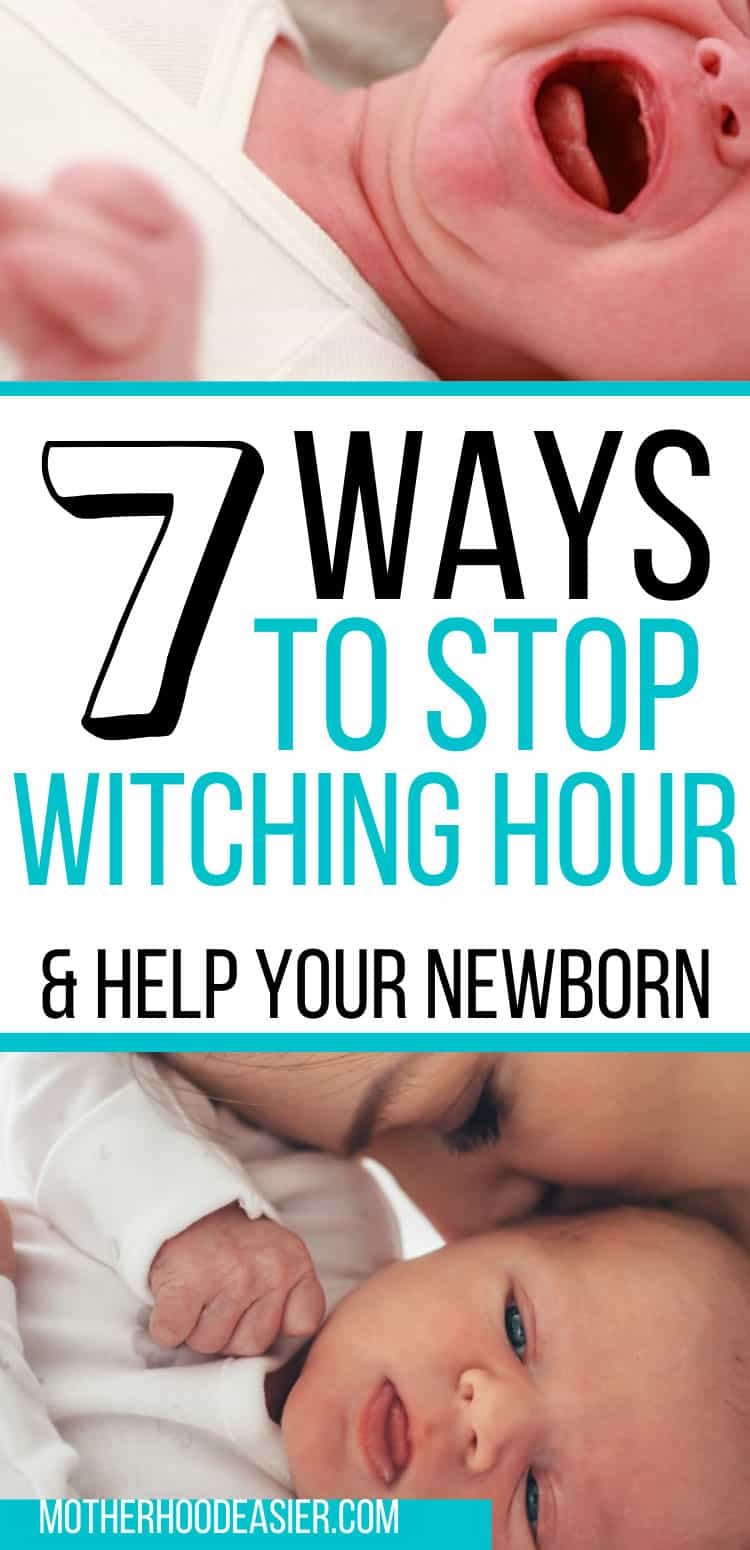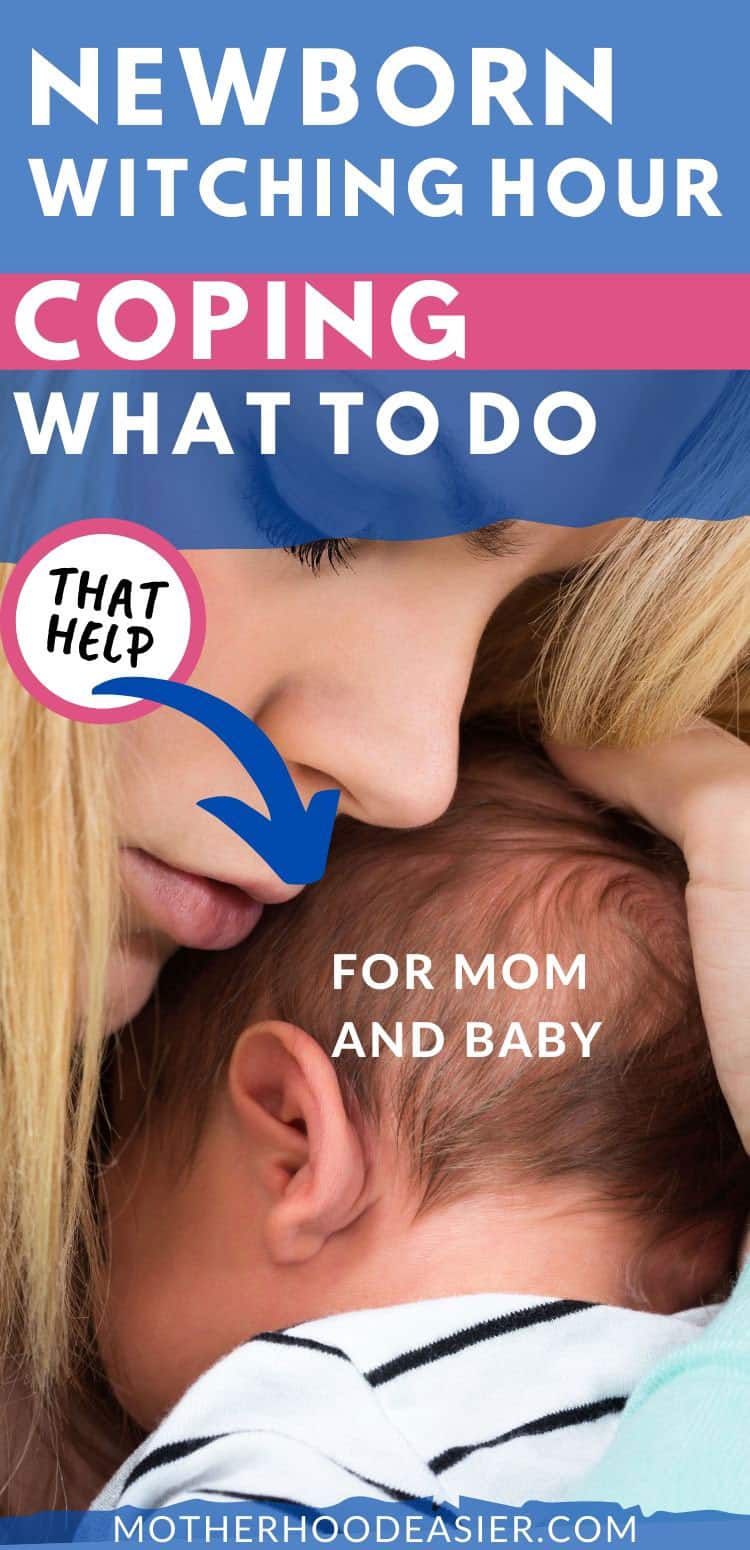Witching Hour for Newborns: Have you ever heard of the witching hour for newborns? I learned about it with my firstborn child. I hadn’t even heard of such a thing till I was experiencing it first hand.
The witching hour is something many parents learn about, where no matter what like clockwork each night your baby begins to get fussy. Nothing seems to really soothe them, it is just a process of trying to soothe with normally no luck.
When Does The Witching Hour Take Place
*This post contains affiliate links at no cost to you. See my disclosure policy here.
You will find anywhere from 5 pm-12 am is when the witching hour can begin. It can start around week two or three and then will peak when your baby is around the six-week mark.
How Long Does The Witching Hour Last
Normally around the three-month mark you will find your baby begins to grow out of the witching hour. Around that time you find cluster feeding begin or they refuse to breastfeed as normal. Either or both of these options are totally normal around that age range and go into the hand with the witching hour.
What Can Cause Your Baby To Be Cranky
You will want to watch to make sure you try and get them to nap regularly. Don’t allow them to get over-tired or that can be a trigger to a meltdown. Another thing is to aim to not overstimulate your little one. You might find triggers like starting to cook dinner, spouse coming home, etc are the beginning of the fussy mood in your baby.

Ways To Help Cope With Witching Hour
Feedings
Take the time and if your baby is needing to cluster feed, you take the time to do it. Breastfeeding can be very comforting to your baby, so if you need to take time to do that, go right ahead.
Related: Newborn Baby Sleep and Feeding Schedule
Meal Time
I know you have to feed your family. But consider stockpiling your freezer to have meals you toss in the oven and can tend to your baby without having to hover over the stove. Or start a slow cooker meal in the morning. That way when the witching hour arrives when you need to be cooking, you already have dinner handled.

Kids
If you need to help your other kids with school work, for example, have them close by so that you can tend to baby while you also help them figure out their math problem.
Skin to Skin
Consider taking a bit of time to do skin to skin with baby. This is a great way to bring comfort to your little one as they are extra fussy. You might find when they get skin to skin it can help calm and soothe them. Babywearing is a great way to hold the baby close during what can be the craziest part of the day.
Five S’s
Dr. Harvey Karp, author of one of my favorite books, creator of the SNOO, (and baby expert) penned the book “The Happiest Baby on the Block.” In it, he describes the 5 S’s which are the best five ways to calm down a newborn. We use a combination of all of them for soothing our newborns when they are fussy and they work like a charm!
- Shhhhh: sound machines or white noise help calm newborns down
- Swaddle: swaddle that baby tight!
- Swinging: put them in a swing or swing them gently in your arms
- Sideways: hold your baby sideways in your arms
- Sucking: pacifiers are a godsend for many children
Step Outdoors
Even if it is slightly chilly out, wrap a blanket around your little one and step outdoors for fresh air. It only takes a few minutes but sometimes getting that cool air can instantly stop a crying baby. Or just the calm sound of outdoors and the change of scenery allows them to put there focus elsewhere and the crying stops.

Ask for Help
Baby’s can sense stress. And if your little one approaches a meltdown and you are feeling overwhelmed your stress can trigger them to be upset. Call in your spouse or even another family member or loved one to hug and love on the baby. Sometimes the switch from a stressed mom to a relaxed aunt is all your little one needs.
I will say though, if you find that your baby is really struggling with fits, it is never a bad idea to reach out to a pediatrician. You may want to make sure they are not dealing with acid reflux or anything else going on that could be triggering their unhappiness.

The witching hour can be trying on parents, but always remember just like the newborn stage, it won’t last forever. This witching hour will last for a phase and then disappear and you won’t have the meltdowns the way you are experiencing now.
Did your baby experience the witching hour? If so how did you find a way to ease them out of their crying fits?
Is it colic?
It is normal for babies to be fussy–and to cry up to two hours a day. Colic occurs when a baby fusses or cries for more than 2 hours a day for no apparent reason.
Colicky babies often have a tight belly, curl their legs towards their belly, clench their fists, and have a bright red face. Their cries are often higher and more urgent than regular baby crying. The best way to figure out if your baby has colic is to consult your pediatrician.
In retrospect, I think my first child had colic. But I didn’t know. I attributed it to normal newborn fussiness. But, none of the subsequent three children experienced anything like my first.
She would be inconsolable between the hours of 6-10 PM. And I would dread the evening hours knowing she would likely cry no matter what I would do from at least 6-8 PM, often crying on for periods of 45 minutes.
What is normal newborn fussiness?
It’s normal for newborns to fuss. So don’t think that if your baby cries, they have colic! Newborns will often “wake up” around three weeks old, and their fussiness will increase until it reaches its peak at 6 weeks. Many experts think that this is just the baby “waking up” and learning to take in all the sensory information from the novel outside world.
Colic is different from normal newborn fussiness. It is more intense, longer-lasting, and the baby is often inconsolable.
When does normal newborn fussiness begin and end?
Normal newborn fussiness usually starts around two weeks. That’s when our “honeymoon period” with the baby usually ended. It increases in frequency and intensity until they are six weeks old, and tapers off until they are about 12 weeks.
How to Cope With the Witching Hour
It’s ok to want to pull your hair out when your baby is crying. Believe me, I have been there. But, you can’t let it get to you. It’s not a reflection of your mothering abilities.
If you find yourself losing it, ask your husband to help during this hard time if it is wearing on you. Or, if you can’t do that, put the baby down if you have to in a basinette or their crib, and take a minute to breathe. Go outside for 2 minutes on your porch if you need to. It will calm you both down.
Newborns fuss, and it’s normal to be stressed about it. Just don’t personalize normal fussiness and the witching hour into thinking you are an inadequate mom!



